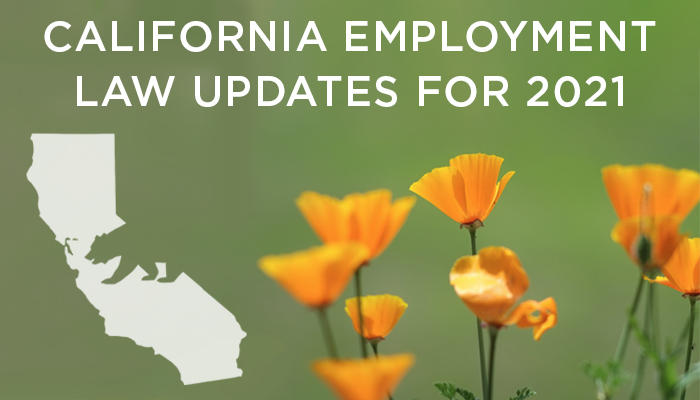2020 has been an unusual year for many reasons, but one thing that remains the same is the enactment of new employment laws by the California State Legislature. Unsurprisingly, several of the laws relate to the coronavirus pandemic, which has had a major impact on the health and livelihoods of Californians. If your business has employees in the state, pay attention to these new laws, most of which come into effect January 1, 2021.
COVID-19
AB 685 (COVID-19 Workplace Exposure Notice and Reporting) There are three key components of this law: 1) Upon receiving notice of COVID-19 exposure in the workplace, the employer has to notify in writing all employees, and the employers of subcontracted employees, who were present on the worksite with the infected employee during the infectious period; 2) The employer must report a COVID-19 “outbreak” (defined as three or more people within a two-week period) to the local public health agency; 3) AB 685 permits Cal-OSHA to close workplaces that “constitute an imminent hazard to employees” due to COVID-19. AB 685 removes some of the Cal-OSHA notice requirements, so businesses must be prepared to act immediately if Cal-OSHA designates a worksite as a hazard area.
AB 1867 (Supplemental COVID-19 Paid Sick Leave) Under this law, which went into effect in September, employees who must leave their home to perform work are entitled to COVID-19 supplemental paid sick leave if they are subject to a quarantine order or prohibited from working by their employer due to COVID-19 transmission concerns. AB 1867 authorizes the employee to determine how many hours of COVID-19 supplemental paid sick leave to use, and requires the employer to make COVID-19 supplemental paid sick leave available for immediate use upon the employee’s request. This law applies to employers with 500 or more employees and public and private employers of first responders and health care employees who opted not to cover their employees under federal law.
Leaves of Absence
SB 1383 (Expansion of Family Care and Medical Leaves) SB 1383 increases the coverage of the California Family Rights Act to employers with five or more employees. The CFRA currently provides a right to take leave to care for an employee’s child, parent, or spouse who has a serious health condition, or to bond with a newborn or newly adopted or placed foster child. SB 1383 expands the scope of the law to include 1) care for a grandparent, grandchild, sibling, or domestic partner who has a serious health condition, 2) “child” will now include the child of a domestic partner and children of any age, 3) a qualifying exigency related to the covered active duty or call to covered active duty of an employee’s spouse, domestic partner, child, or parent in the Armed Forces of the United States.
AB 2017 (Employee Designation of Reason for Use of Sick Leave) California’s “Kin Care” law gave employees the ability to use up to half of their employer-provided sick leave to care for an ill family member. The enactment of the Healthy Workplace, Healthy Families Act in 2014 expanded the reasons for which an employee could use sick leave. Current law allows the employer to determine how to apply sick leave to an employee’s absences. AB 2017 gives employees the “sole discretion” to determine the reason to use their available sick leave.
AB 2992 (Expansion of Crime Victim Leave) Employers are currently restricted from firing, retaliating against, or otherwise taking any action against a victim of domestic violence, sexual assault, or stalking for taking time off from work to obtain a restraining order, medical attention, or psychological counseling. AB 2992 expands the leave protections to victims of any violent crime, and to immediate family members of homicide victims. Employees are entitled to the leave “regardless of whether any person is arrested for, prosecuted for, or convicted of, committing the crime.”
AB 2399 (Expansion of Paid Family Leave Benefits for Military Exigencies) California’s family temporary disability insurance program (known as Paid Family Leave) was expanded in 2018 to provide benefits for time off to be with a family member who was being deployed on active duty in connection with a military exigency. AB 2399 expands the definition of “military member” to include a child, spouse, domestic partner, or parent of the employee, where the military member is on covered active duty or is called to active duty in the U.S military.
Equality and Diversity
SB 973 (Pay Data Reporting) SB 973 states that by March 31, 2021, and by March 31 each year thereafter, private employers with 100 or more employees and who are required to file a federal EEO-1 report must submit a pay data report to the Department of Fair Employment and Housing that covers the previous calendar year.
AB 979 (Corporate Board Diversity) AB 979 requires all publicly held companies whose principal offices are located in California to have a minimum of one director from “underrepresented communities” on their board. It defines “underrepresented community” as “Black, African American, Hispanic, Latino, Asian, Pacific Islander, Native American, Native Hawaiian, or Alaska Native, or who self-identifies as gay, lesbian, bisexual, or transgender.”
As a reminder, the deadline for mandatory sexual harassment training under SB 1343 and SB 778 is coming up. California employers with five or more employees are required to provide sexual harassment prevention training to all employees by January 1, 2021, and every two years thereafter.
It is critical to ensure that your business is up to date with these annual employment law changes. Your staffing partners must also remain abreast of current legal requirements. Our team at Innovative Career Resources & Staffing routinely attends conferences and webinars, and are proactive in our compliance. We would love to assist with your hiring needs—contact us today to see how we can help your business thrive.

